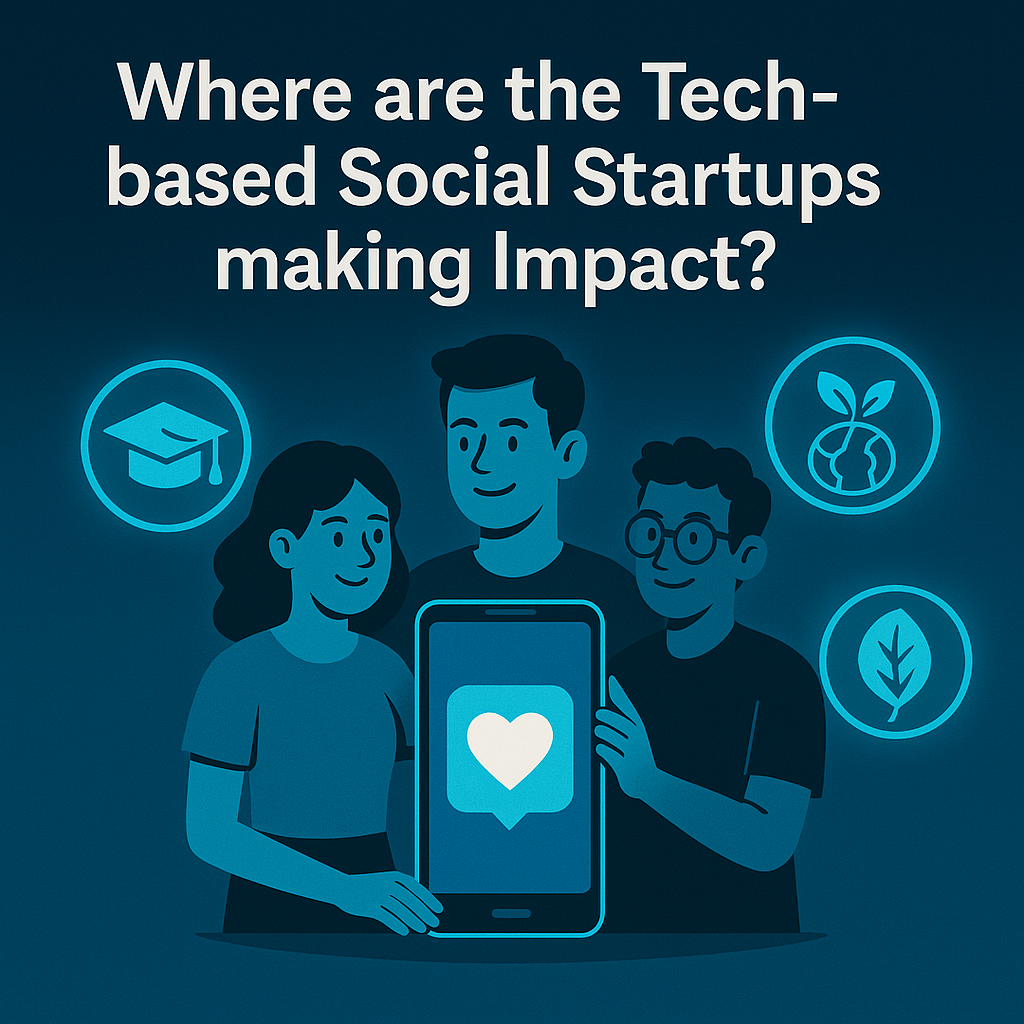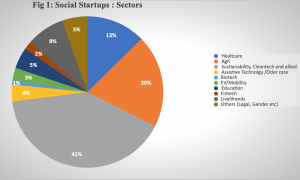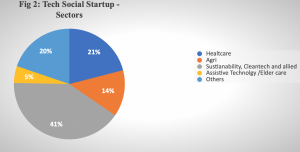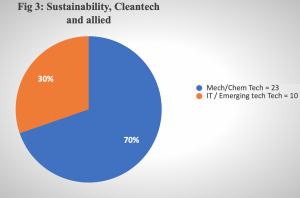
04 May Where are the Tech based Social Startups making Impact?
Banner image generated using ChatGPT, OpenAI May 2nd 2025
This article is part of a series on Tech-based Social Startups in India. You can find the full series here.
While technology is central to many Indian social startups, the usage of technology is not consistent across the wide breath of social Impact ecosystem. In fact, as one digs into the details, one sees that tech startups are dominated by few select sectors.
In a previous article, we highlighted the nature and extent of the use of technology by Social Startups from some of the top social enterprise incubators and investors in India [based on a curated database of 100+ Social startups]. This article explores, what are the sectors where Social Tech Startups are most active in and what does this mean for the wider social impact ecosystem,
A sectoral analysis, reveals some interesting trends. As mentioned in the previous blog, Social Startups generally are divided in two broad categories –
- Those who work for people at the grassroots or marginalized people [e.g. helping people with disabilities, improving access to clean water for the marginalized]
or - Those who work for society at large [e.g. Environment or Healthcare improvement that have more broad-based impact] [1].
With the exception of Assistive Tech, generally Social Startups which work for society at large tend to be more readily deploying tech solutions.
This is seen in the database, both in the case of social startups generally and in Tech-based Social Startups specifically. The space is dominated by Social Startups working for society at large [50%+] i.e. startups from areas like Sustainability [40%], and Healthcare [13%] [See Fig 1]. However, in case of Tech-based social startups this is even more stark, with startups from areas like Sustainability having over 60+ [41%], and Healthcare [21%] [see Fig 2].
On the other hand, Social Startups which work for people at the grassroots or Livelihoods for marginalized people drops by almost half to 5% from and already low 8%.

Fig. 1

Fig. 2
Even further break down of the 33-tech based social startups from sustainability sector shows [Fig 3] that even in Sustainability 70% of tech is from Mechanical or Chemical engineering and only 30% is IT or emerging tech (in case of Tech using multiple type of Techs like Mechanical and IT, based usage they have classified as IT or emerging tech.)

Fig. 3
Sectoral Disparities in Tech Deployment with prioritization of broad societal challenges is also seen.
It is clear from above analysis, limited as it is, that use of tech esp. IT/Emerging and/or Deep tech is limited in Social Tech space. When it does occur, it tends to be in Social Startups working for society at large, rather than ones working at the grassroots like Livelihoods. Tech use even in sectors like Climate/Sustainability is dominated by Mechanical or Chemical engineering.
This reflects the fact that social enterprises working for society at large – solutions for sustainability (e.g., clean energy, waste management) and healthcare – often demand hardware-driven innovations rather than software-based tools. For instance, in sustainability-focused startups, 70% of technological solutions involve mechanical or chemical engineering, such as low-cost solar devices or biodegradable materials.
Tech-driven social startups disproportionately target societal-level challenges (50%+ of the dataset), particularly in sustainability (43%) and healthcare (16%). For example, ventures in renewable energy, circular economy models, or telemedicine platforms dominate this segment. In contrast, startups addressing grassroots or marginalized communities—such as livelihood generation or disability inclusion—constitute only 5% of tech-enabled ventures. This disparity suggests that scalability and market viability incentivize technological investments in sectors with broader stakeholder engagement, while solutions for marginalized groups may face higher barriers to tech integration, such as affordability or digital literacy.
Balancing Technological Ambition with Pragmatism
The prevalence of incremental tech adaptations over deep tech innovations highlights a strategic trade-off. While leveraging proven technologies ensures faster deployment and scalability, it may limit transformative breakthroughs. Stakeholders—including incubators, investors, and policymakers—must balance support for applied solutions with long-term investments in research-driven ventures. For instance, partnerships with academic institutions could foster deep tech pipelines, while grant funding might de-risk early-stage prototyping.
Data Limitations and Future Research
The study’s reliance on curated, non-exhaustive data—excluding non-profits and defunct ventures—limits its generalizability.
Conclusion
India’s tech-enabled social startups demonstrate a clear preference for pragmatic, sector-specific technological solutions over disruptive innovations. While sustainability and healthcare ventures lead in adopting mechanical and chemical engineering advancements, grassroots-focused sectors remain underserved by cutting-edge technologies. The limited presence of deep tech underscores systemic challenges in translating research into scalable impact. Moving forward, ecosystem builders must prioritize sector-specific enablers, foster academia-industry collaborations, and address data gaps to unlock the full potential of technology in driving equitable social change. There is need for more sustained action to help Social Startups adopt emerging tech to help amplify their Impact.
Footnotes:
1 https://aic.iiit.ac.in/ai-and-social-startups-an-indian-overview/


